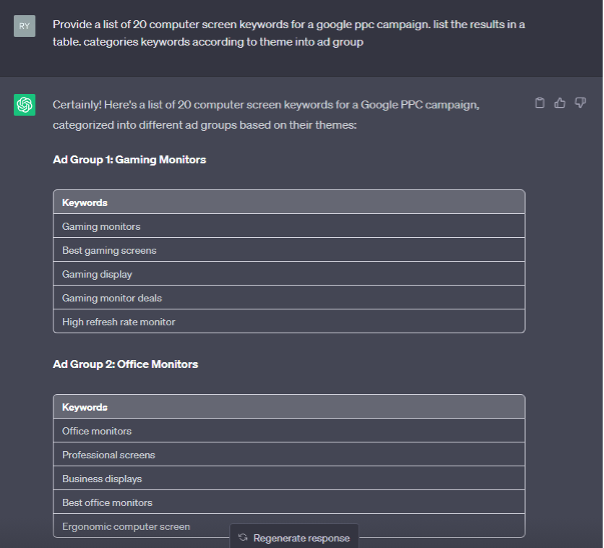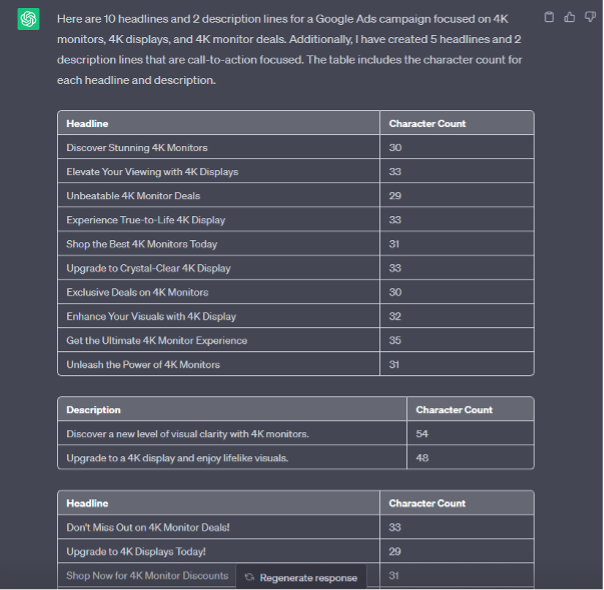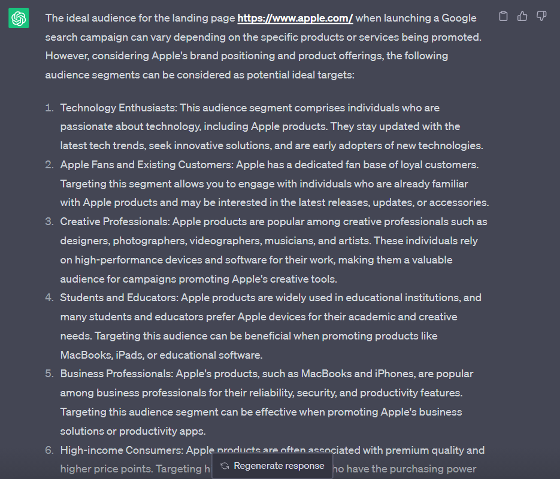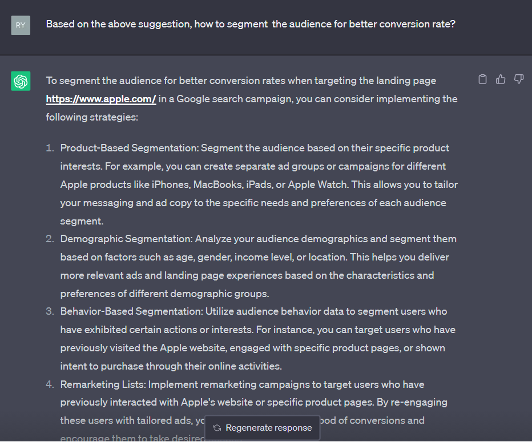ChatGPT is the AI language model that is used to generate conversational responses based on prompts. When employed correctly, it can empower PPC account managers to create optimised ad content and help inform PPC execution and decision making.
As a digital savvy marketing agency, we believe that our critical thinking plays a pivotal role in marketing decisions. We therefore think it’s wiser to leverage the output from ChatGPT and combine it with our years of PPC experience to develop and deliver the best-tailored solutions for our clients. In this blog, we will share our top 3 favourite prompts for ChatGPT for PPC marketing, along with what we believe to be the limitations that need to be taken into consideration.
Keyword research
PPC keyword research is crucial to the success of PPC campaigns. And, it’s one of the recurring tasks needed in any PPC campaign as it helps identify keywords according to relevance, performance and volume. Since search trends are ever-changing, ongoing keyword research is essential to identify emerging opportunities and to capitalise on market demands. While there are numerous keyword research tools available in the market, using ChatGPT with the following prompt could help you brainstorm keyword ideas:
Prompt: Provide a list of 20 computer screen keywords for a Google PPC campaign. List the results in a table. Categorise keywords according to theme into ad group.

To increase the likelihood of successfully returning results, it is important that you provide as much information as possible to ChatGPT. Personally, I recommend providing clear guidelines and formulating the commands in complete sentences. For example, state specifically how you would like your results to be returned, such as categorising keywords results according to themes; returning the result in a table format for clear presentation. Bear in mind that ChatGPT does not have access to any real-time data, it therefore would not be able to provide information like keyword search volume.
Ad copy suggestions
Crafting the perfect ad copy for optimal conversion performance is a never-ending task, as it requires constant reviews and consideration of various factors that contribute to its success. ChatGPT could also provide you with a valuable starting point when writing a responsive search ad for the PPC campaign:
Prompt: use keywords 4k monitors, 4k display, 4k monitor deals to produce 10 headlines and 2 description lines for a responsive search ads for a Google ads campaign. Create another 5 headlines and 2 descriptions that are call-to-action focused. List the result in a table. Separate a column to show the character count.

Responsive Search Ad, which is the default ad format for Google Search Ads, is notorious for creating ad combinations that may not make sense to users. Therefore, careful consideration of your input as headline, description and ad combination strategy are crucial for every advertiser. A recommended best practice is to include your popular keyword phrases and call-to-action focused wording. By simply informing ChatGPT the keywords you would like to include and call-to-action lines with the specified keywords, you will be able to gain initial insights on how to structure your ad copy.
In terms of downsides, you may have noticed from the above character count prompt and table column that ChatGPT is not good with numerical requirements. Remember to trim down and rephrase the ad copy it produces so it fits within specific character limits as per Google Ads requirements.
Define the ideal audience
Defining the right audience for a PPC campaign is essential as it provides guidance for the right text in the ad copy, the relevant keywords to use and the relevant targeting options to opt in. And, most importantly, it ensures we are speaking the target audience's language and ultimately attracting them to click on the ads then convert. In this example, we use the Apple website to ask ChatGPT to define our ideal audience to target when launching any Google search campaign:
Prompt: Who is the ideal audience for the landing page https://www.apple.com/ when launching a Google search campaign?

From the above prompt, ChatGPT returned 7 major types of audience it has defined based on the landing page provided. We can immediately define the targeting criteria and create relevant campaigns based on the audience insights. Alternatively, you may follow-up with another prompt to ask ChatGPT how to segment the mentioned audience for a better conversion rate:

While there are countless combinations of audience and ad messaging to yield optimal results, the above prompts suggested various audience segmentation that Google advertisers could employ. For example, remarketing campaigns are best used to re-engage website visitors who have not yet converted on their first time visit. Delivering tailored ad messaging to drive these high-intent users to convert could therefore maximise the efficiency of your campaigns.
No one-size-fits-all solution for our PPC clients
Each PPC campaign is unique. At M3, we are only dedicated to providing the most customised solution according to our clients’ key performance indicators (KPIs) and campaign objectives. There are so many more prompts to explore that greatly benefit Google Ads results and the AI technology will only continue to evolve. After all, we are in the era of AI automation.
Curious about how we can help you deliver your next PPC campaign? Discover how we successfully boosted lead results for our client Amplifi or contact us today for a free consultation and discuss how we create a tailored PPC strategy to help your business thrive!






